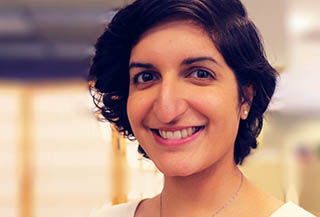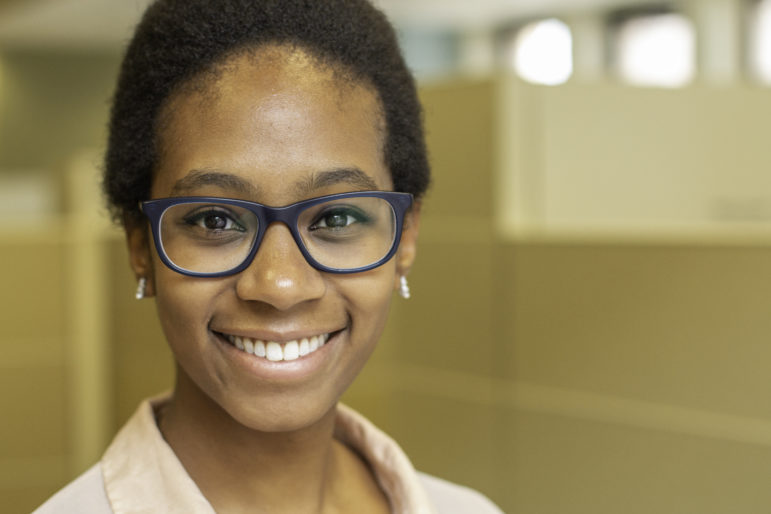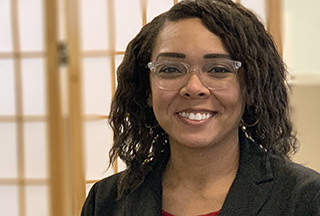With the departure of Ben Passer, a long-time contributor and founder of the Energy Access and Equity (EAE) team here at Fresh Energy, the EAE team is entering a new stage of growth. Joining current program staff Janiece Watts and Mari Ojeda, newest member and Lead Director of Energy Access and Equity Anjali Bains breaks down what’s happening and what’s to come.
As our trees begin to change their hues and our state settles into a new season, so the Energy Access and Equity (EAE) team is turning over a new vibrant leaf of its own. Building on the inspired and dedicated leadership of our predecessor, and exciting progress to date, the EAE team is poised to continue our important work while also expanding into new areas. We are proud to share four major ways we are ensuring the transition to a carbon-free economy is just and equitable.
Reduce the energy burden on under-resourced households, renters, and multifamily residents.
Increasing investments in and access to energy efficiency and solar to reduce the energy burden on under-resourced households, renters, and multifamily housing residents is the bedrock of the Energy Access and Equity team and will continue to be a priority under the leadership of our Policy Associate, Mari Ojeda. Energy burden, defined as the percentage of household income spent on energy costs, is higher for under-resourced households than for the average household. This holds true even in a state like Minnesota, which consistently ranks among the top ten states for energy efficiency policy but where under-resourced households on average experience an energy burden of 8% compared to a state average of 2%. Some households—particularly those in Greater Minnesota—experience energy burdens as high as 30%.
To reduce these energy burdens, Fresh Energy has frequently advocated for increasing how much utilities invest and spend on energy efficiency programs for under-resourced households. We have also advocated for expanding eligibility for these programs so that more renters and multifamily properties can participate in them, as well as broadening what the funds can be used for so that necessary precursors to energy efficiency improvements (e.g. pre-weatherization) can be addressed as well. All these aspects and more were a part of the Energy Conservation and Optimization (ECO) Act that passed the Minnesota state legislature last spring. Fresh Energy will continue working with the Department of Commerce and other key partners to implement ECO Act in the coming year.
Cut the carbon, health, and financial cost of transportation for under-resourced, BIPOC, and other marginalized communities.

My previous role at Fresh Energy was on the Energy Transition team, leading our electric transportation work. I’m excited to bring that expertise with me to EAE, with a shifted focus. While the eventual new electric transportation lead at Fresh Energy will continue to plan for and strategize how to accelerate electric vehicle adoption and charging infrastructure investment in a way that benefits our grid and climate, I will be exploring how to expand access to and affordability of clean transportation for more communities, particularly those which are under-resourced, predominantly Black, Indigenous, and people of color (BIPOC), or otherwise most impacted by climate change and air pollution. While reducing climate change-causing emissions will be a central focus, equally important will be reducing the negative health impacts and cost burdens of our fossil fuel-based transportation system on these communities. Fresh Energy will do so by engaging at the Minnesota Public Utilities Commission and the state legislature to promote clean and equitable transportation policies and programs, such as point-of-purchase electric vehicle rebates and electric vehicle charging programs that are accessible to and designed for under-resourced, BIPOC, and pollution-burdened communities as well as renters and multifamily housing residents.
Beyond electrification of personal vehicles, we will continue to work with partners like those in the Coalition for Clean Transportation to promote investments in clean transit and active transportation; electrify our medium and heavy-duty vehicles, including school buses; and build and strengthen relationships with organizations focused on environmental justice and racial equity to prioritize and support their policy goals.
Partner with local governments to set and implement equitable climate action goals.
While Fresh Energy has made its name at the state level, we’ve also been exploring how to better engage and influence outcomes on a more local level. Our new Director of Culture and Partnerships, Janiece Watts, is leading this initiative alongside Senior Policy Associate on the Public Affairs team, Anna Johnson. As not only members but leaders of their respective citywide climate justice advisory groups—Janiece co-chairs Saint Paul’s Climate Justice Advisory Board while Anna is Vice Chair of Minneapolis’ Community Environmental Advisory Commission—both are uniquely situated to directly share their expertise on issues of climate, environmental justice, and racial equity with each city. To date their efforts have included advocating for the prioritization of and investment in energy efficiency in community rebuilding efforts after the uprisings following the murder of George Floyd, as well as submitting public comments for draft plans from governing bodies like the Environmental Quality Board to the Metropolitan Council.
A notable example of successful engagement and influence came with the Hennepin Climate Action Plan. The plan—the first of its kind for the county—underwent significant revisions to increase its ambition and better address the ongoing crises of the COVID-19 pandemic and racial injustice alongside climate change as a result of Fresh Energy and partners’ advocacy during both the formal public comment process and in discussion with county leadership. Fresh Energy will continue to build its local influence, especially ensuring that more local planning recognizes we cannot solve the climate crisis without supporting the COVID-19 recovery and progressing racial justice.
Strive for equity and justice internally and in all Fresh Energy policy work.
Finally, a key priority of the Energy Access and Equity team beyond our specific program work is to collaborate across all Fresh Energy teams to build in equity from the outset, so that we achieve it in both process and outcome. While Fresh Energy has made progress in this area, particularly over the past several years, both internally through our Diversity, Equity, and Inclusion and Anti-Racism initiatives and externally through our program work such as the Midwest Building Decarbonization Coalition or our newest program, gas decarbonization, this work is truly a journey—one which the Energy Access and Equity team is eager and excited to support.
What’s next?
As the EAE team settles in, there will be plenty more opportunities to share our work, from supporting ECO Act implementation, to building new partnerships and strengthening existing ones, to pursuing policies and programs that increase access to clean transportation. Stay tuned for more from our team in the coming months, including a close look at the electrification of multifamily housing in Minnesota, created with key partners in collaboration with the Department of Commerce and funded by the U.S. Department of Energy. We’ll also share a conversation about another crucial aspect of our internal work, anti-racism. And send your congratulations to Janiece for earning a spot on the 2021 Young, Gifted, and Green 40 Under 40 List, along with an impressive cohort of environmental justice leaders of color, including Leah Thomas, SZA, Representative Alexandria Ocasio-Cortez, and Representative Lauren Underwood! Until then, catch the full story of our Energy Access and Equity evolution on our podcast, “Decarbonize: The Clean Energy Podcast.”


